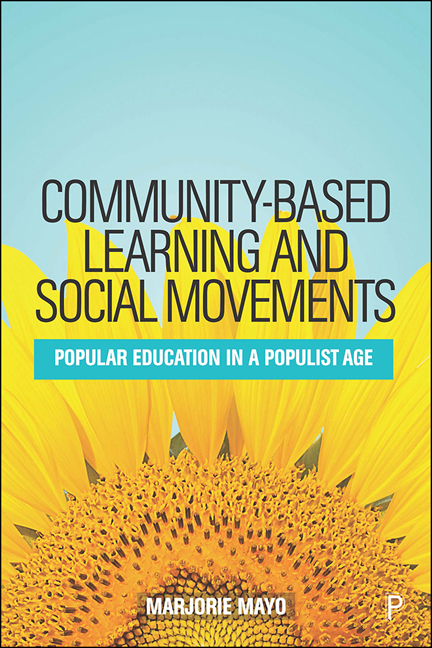Book contents
- Frontmatter
- Dedication
- Contents
- List of Figures
- Acknowledgements
- 1 Popular Education in a Populist Age
- 2 Popular Education and its Roots
- 3 Spaces and Places for Popular Education and Participatory Action Research
- 4 Principles and Practice
- 5 Sharing Understandings of Varying Histories and Cultures
- 6 Making Connections: Linking Issues and Struggles Across Space and Time
- 7 Power and Power Analysis
- 8 Community–University Partnerships
- 9 Taking Emotions into Account
- 10 Looking Backwards, looking Forwards
- References
- Index
1 - Popular Education in a Populist Age
Published online by Cambridge University Press: 10 March 2021
- Frontmatter
- Dedication
- Contents
- List of Figures
- Acknowledgements
- 1 Popular Education in a Populist Age
- 2 Popular Education and its Roots
- 3 Spaces and Places for Popular Education and Participatory Action Research
- 4 Principles and Practice
- 5 Sharing Understandings of Varying Histories and Cultures
- 6 Making Connections: Linking Issues and Struggles Across Space and Time
- 7 Power and Power Analysis
- 8 Community–University Partnerships
- 9 Taking Emotions into Account
- 10 Looking Backwards, looking Forwards
- References
- Index
Summary
Inescapably we live in both interesting and disturbing times. (Boffo et al. 2019: 247)
‘Inequality is maintained by misleading the public’, Danny Dorling has argued, with governments blaming their predecessors for the 2007– 08 financial crisis (Dorling, 2018: 5). Adding insult to injury, he has continued, British governments have been attempting to justify the policies of austerity that have followed, shifting the costs onto the poorest and most deprived in contemporary Britain. It has been these most vulnerable groups who have then been held to blame, the so-called benefit scroungers, the immigrants, the refugees, the Muslims – anyone other than those who had actually caused and then benefited from the crisis in the first place. Symptomatically the Oxford dictionaries selected ‘post-truth’ as word of the year in 2016, defining this as shorthand for circumstances in which objective facts are less influential in shaping public opinion than appeals to emotion and personal belief. This has been about promoting the politics of misplaced blame and fear rather than the politics of reasoned democratic debate.
The UK is becoming increasingly polarised, not only economically, but also politically. Far Right politicians have been exploiting people's anxieties in this precarious climate, playing on popular feelings of alienation and distrust. This has been causing growing concern, both in Britain and elsewhere, with the rise of xenophobia (Fekete, 2009) and of White Supremacist movements in different contexts. The media – including social media – have the capacity to exacerbate such emotions, re-enforcing feelings of anxiety and resentment.
Meanwhile authoritarian populist governments have been coming to power, from Europe to Latin America and beyond, including India, where Far Right politicians have been associated with violent attacks on minority communities in the recent past. Such violent episodes characterise the behaviour of those at the most extreme end of the Far Right spectrum. But they serve as warnings about the possible outcomes of the politics of hatred.
While the Far Right has been spreading these toxic messages, others have been responding to the challenges of neoliberal austerity in very different ways, offering very different explanations of the causes of people's problems.
- Type
- Chapter
- Information
- Community-based Learning and Social MovementsPopular Education in a Populist Age, pp. 1 - 18Publisher: Bristol University PressPrint publication year: 2020



